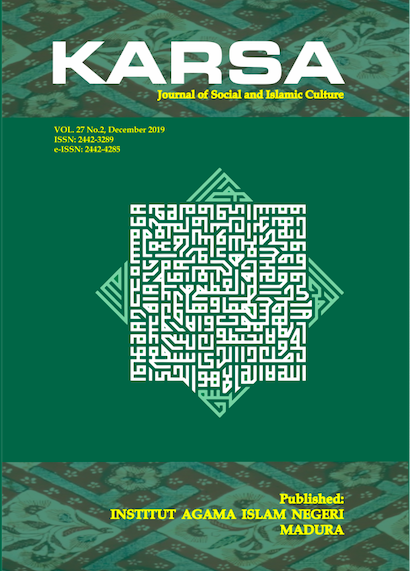The Revelation of the Potential Culture and Entrepreneurship: An Effort to Minimize the Unemployed Graduates of Salaf Islamic Boarding Schools in Tapal Kuda Areas, East Java, Indonesia
 Abstract views: 276
,
Abstract views: 276
,
 PDF downloads: 246
PDF downloads: 246
Abstract
Downloads
References
Alma, B. Entrepreneurship: For Students and the Public. Bandung: Alfabeta, 2008.
Bogdan, R. and I.S. Taylor. Introduction to Qualitative Research to the Social Sciences. New York: John & Sons Inc.,1975.
Hall, J. J. Daneke and M. Lenox. “Sustainable development and entrepreneurship: past contributions and future directions.” Journal of Business Venturing 25, (2010): 439-448.
Halim, W. “Peran Pesantren dalam Wacana dan Pemberdayaan Masyarakat Madani.” Akademika 22, no. 02 (2017): 191-218.
Hamid, A. Pendidikan Karakter Berbasis Pesantren: Pelajar dan Santri dalam era IT dan Cyber Culture. Surabaya: Imtiyas, 2017.
Haryono, A. Etnografi Komunikasi: Konsep, Teori, dan Contoh Penelitian Pola Komunikasi. Jember: UPT Publishing University of Jember, 2015.
Haryono, A. “Pola Komunikasi di Pesantren Salaf ‘A’ Jember (Kajian Sosiolinguistik).” Master’s thesis, Universitas Negeri Sura-baya, 2006.
Haryanto, S. “Persepsi Santri Terhadap Perilaku Kepemimpinan Kiai di Pondok Pesantren: Studi Interaksionisme Simbolik di Pondok Pesantren Sidogiri Pasuruan.” PhD thesis, Universitas Islam Negeri Maulana Malik Ibrahim, 2011.
Hardjono, S. Prinsip-Prinsip Pengajaran Bahasa dan Sastra. Jakarta: Departatemen Pendidikan dan Kebudayaan, 1988.
Hasan, M. “Wasatiyyah Islam in The Pesantren Islamic Education Tradition Framework.” KARSA 26, no. 2 (2018):177-194.
Himmah, R.H., and M.A. Amrulloh. “Pengembangan Kurikulum Bahasa Arab Pesantren Mu’adalah (Studi Kasus di Pondok Pesantren Al-Kausar Genteng Banyuwangi).” Jurnal Al Bayan 9, no. 2 (2017): 75-89.
Hisrich, R.D. and M.P. Peters. Entrepreneurship: Starting, Developing, and Managing a New Enterprise. Homewood, IL: Irwin, 1995.
Isbahi, M. B. “Budaya “Pakewuh” Santri pada Kyai:Relevansi Budaya Pendidikan Pesantren terhadap Tantangan Dunia Islam di Era Globalisasi” Millatī, Journal of Islamic Studies and Humanities 3, no.1 (2018): 103-124.
Izfanna, D. and N.A. Hisyam. “A comprehensive approach in developing akhlaq: A case study on the implementation of character education at Pondok Pesantren Darunnajah.” Multicultural Education & Technology Journal 6, no. 2 (2012): 77-86. doi:10.1108/17504971211236254
Kompri. Manajemen & Kepemimpinan Pondok Pesantren. Jakarta: Prenadamedia Group (Divisi Kencana), 2018.
Lumpkin, G. T. and G.G. Dess. “Clarifying the Entrepreneurial Orientation Construct and Linking It to Performance.” Academy of Management Review 21, no.1 (1996). https:// journals.aom.org/doi/pdf/10.5465/amr.1996.9602161568.
Mastuhu. Dinamika Sistem Pendidikan Pesantren: Suatu Kajian Tentang Unsur Dan Nilai Sistem Pendidikan Pesantren. Jakarta: INIS, 1994.
Manshur, F.M. “Budaya Pesantren dan Tradisi Pengajian Kitab.” Humaniora, no. 8 (1998): 46-52.
Maunah, B. “Pesantren in the Perspective Social Change.” Jurnal Ushuluddin 30, (2009): 251-282.
Moleong, J. Lexy. Metode Penelitian Kualitatif. Bandung: PT. Remaja Rosdakarya, 1993.
Nasir. A. S. “Pendidikan Islam di Pesantren (Studi tentang Tipe Pesantren).” Jurnal Pancaran Pendidikan 16, no.4 (2003): 96-106.
Rahardjo, Dawam (ed.). Pesantren dan Pembaharuan. Jakarta: LP3ES, 1988.
Raihani, “Exploring Islamic School Leadership in a Challenging Southern Thailand Context.” Studia Islamika: Indonesian Journal for Islamic Studies 24, no.2 (2017): 271-294.
Sari, M.M.E. “The Role of Learning Management of Islamic Boarding School (Pesantren) in Improvement of Their Students Religious Tolerance in West Java Indonesia.” International Journal of Innovation and Applied Studies 19, no.1 (2017): 24-32.
Sutarto, A. Pesantren, Budaya Lokal, dan Prahara Informasi dalam Menjinakkan Globalisasi: Tentang Peran Strategis Produk-Produk Budaya Lokal. Jember: Kompyawisda & Universitas Jember, 2002.
Sutarto, A. Pesantren dan Politik Tinjauan Kultural-Historis dalam Menguak Pergumulan antara Seni, Politik, Islam, dan Indonesia. Jember: Kompyawisda & Universitas Jember, 2004.
Wahid, A. Pergulatan Negara, Agama, dan Kebudayaan. Depok: Desantara, 2001.
Wardi, M. “Pengembangan entrepreneurship berbasis experiential learning di pesantren Al-Amien Prenduan Sumenep dan Darul Ulum Banyuanyar Pamekasan.” PhD Thesis, UIN Sunan Ampel Surabaya, 2017.
The journal operates an Open Access policy under a Creative Commons Non-Commercial Share-Alike license. Authors who publish with this journal agree to the following terms:
- Authors retain copyright and grant the journal right of first publication with the work simultaneously licensed under a Creative Commons Attribution License that allows others to share the work with an acknowledgement of the work's authorship and initial publication in this journal.
- Authors are able to enter into separate, additional contractual arrangements for the non-exclusive distribution of the journal's published version of the work (e.g., post it to an institutional repository or publish it in a book), with an acknowledgement of its initial publication in this journal.
- Authors are permitted and encouraged to post their work online (e.g., in institutional repositories or on their website) prior to and during the submission process, as it can lead to productive exchanges, as well as earlier and greater citation of published work.





















